Long Live the King

Today, January 8, is Elvis Presley’s birthday. He would have been 72.
When people learn I am an Elvis specialist, they often ask me, “Did Elvis Presley make any good movies?”
The answer, sadly, is no. Elvis Presley did not make any good movies.
There are, however, good Elvis Presley movies.
Elvis Presley made 31 feature films between 1957 and 1969 and, by any objective measure, they’re all terrible. Elvis movies, like James Bond movies, Star Trek movies, Bollywood musicals, Italian zombie movies and Japanese horror movies, cannot be enjoyed if compared to other “real” movies. They’re horrible. They’re beyond horrible. They’re stupid, boring and comically inept. You watch an Elvis movie and you can’t believe people went to see them, three times a year, for ten years. You watch an Elvis Presley movie and you can’t believe Elvis Presley was ever a star, much less the most important American artist of the twentieth century. You watch an Elvis movie and it seems unbelievable that Elvis was, when his film career began, the biggest star on the planet. You watch an Elvis movie and you have to remind yourself that these movies were made at the same time as Dr. Strangelove, West Side Story, Persona, Lawrence of Arabia, Jules et Jim, Bullitt, 2001: A Space Odyssey and Bonnie and Clyde, not to mention A Hard Day’s Night, Help! and Yellow Submarine. The biggest star on the planet couldn’t get a decent movie made around him to save his life. And as a result, he became no longer the biggest star on the planet.
There are a lot of reasons for this, which I can go into another time. Hint: they have to do with Col. Tom Parker being an evil, evil man.
For us Elvis fans, the movies’ flaws only make them more endearing. If you take them on their own terms, if you approach them with the same level of expectation you would have for, say, an episode of Here’s Lucy, they are perfectly engaging. As a chapter in Elvis’s career, they are an important step in his development as an artist — that is to say, they gave him twelve years of unbelievably crappy songs to sing so that he could “come back” in 1968.
THE WELL-INTENTIONED GENRE PIECES
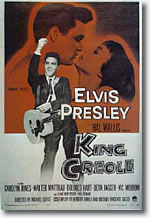
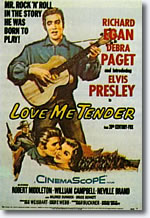

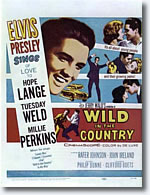
Cineasts will say that King Creole, which co-stars Walter Matthau and is directed by Michael Curtiz, qualifies as a “good” Elvis Presley movie. But they are wrong. King Creole is a middling noir which, for some reason, stars Elvis Presley. Elvis tried to make a number of “real” movies, that is, movies that “just happened” to star Elvis Presley. These include Love Me Tender, a Civil War drama, Wild in the Country, a “juvenile delinquent” drama written by Barton Fink himself, Clifford Odets, and Flaming Star, a western drama, starring Elvis as a half-breed, directed by Don Siegel. It’s impossible to enjoy these movies as genre pieces because, well, because Elvis Presley is in them. He’s not believable as a cowhand, a half-breed or a down-on-his-luck kid. First, he’s not a very talented actor, second, he throws off charisma like a 1,000,000-watt lightbulb, blasting character, plot and every other actor offscreen (or into irrelevance). So you’ll have a couple of actors sitting around talking, pretending they’re in a “real movie,” and then ELVIS PRESLEY walks in and any sense of watching a “real movie” goes right out the window. It doesn’t get any better when he starts singing; there’s no reason why these movies would need to have singing in them at all (they were all developed as dramas — King Creole was originally about a boxer who gets into trouble with the mob [that is to say, it was originally a boxing movie]) –songs were shoehorned into existing scripts and it shows.
Of these four, King Creole has the best songs — that is, real Elvis Presley songs, not cringe-inducing novelty numbers (which sprout in abundance later, as we will see). The title song is a smash and the movie also includes “Hard Headed Woman, “Trouble” and “Crawfish.”
THE CREAM OF THE CROP
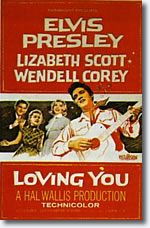
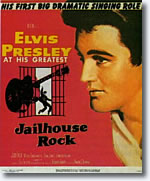
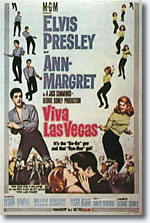
This is it. This is the best Hollywood could do. These three movies have it all. Elvis plays someone very much like himself, so there isn’t that awkward Elvis/reality schism. He sings, all-in-all, wonderful songs opposite real actors. He explodes off the screen. He is sexy, hot-headed, dynamic, graceful and bursting with energy. The direction and editing have zazz and pluck. In Viva Las Vegas, he even stars opposite a woman who can hold the screen with him. They are superlative entertainments and, more importantly, they are excellent showcases for Elvis’s talent. Viva Las Vegas also gets a gold star for being the one “Elvis Movie” that shows that the whole idea of an “Elvis Movie” can work as entertainment.
By “Elvis Movie” I’m speaking of a classically stupid, unbelievable, nonsensical concept that exists simply as an excuse for Elvis to sing, do something “exciting” (usually in front of obvious rear-screen projection) and kiss pretty girls. In the case of Viva, for instance, Elvis is a singing race-car driver who has to choose between wooing Ann-Margret and winning the big race. See? You wouldn’t go to see that movie. That’s a stupid idea for a movie. It is, in fact, a retarded idea for a movie. Imagine, if you will, George Clooney starring as a singing race-car driver who must choose between wooing Ann-Margret and winning the big race. You couldn’t get that movie made today. But it makes perfect sense as an Elvis Presley movie and is the model for the genre. The soundtrack also includes “You’re the Boss,” a number cut from the movie, that sounds astonishingly like Elvis singing on a Tom Waits record.
THE BIG-BUDGET ELVIS MOVIES
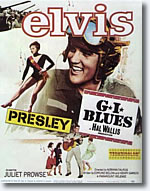

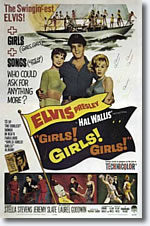
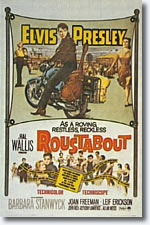
These movies are all professionally made, make no sense, are produced by Hal Wallis, made money and do what they’re supposed to do. I hate them. They are boring, pedestrian, and exist to make Elvis Presley “safe” for middle-class America.
There is a thing that happens in Elvis movies, where the composers can’t be bothered to come up with an original song so they re-purpose a copyright-free song and write new words to it. In Blue Hawaii it’s “Alouetta.” In another one it’s “Three Blind Mice.”
Girls! Girls! Girls! features “Song of the Shrimp,” where Elvis sings the tale of a shrimp who longs to climb aboard a shrimp boat to see the legendary land of Louisiana. All four of these movies include lullabies, and/or songs sung to mothers.
MY PERSONAL FAVORITES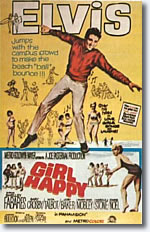
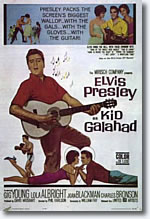
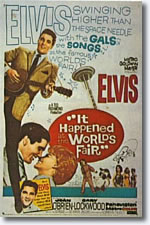

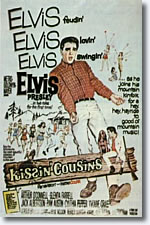
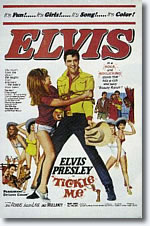

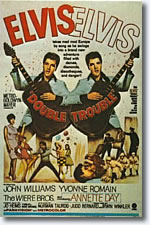
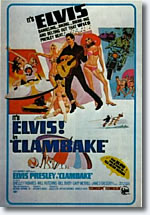
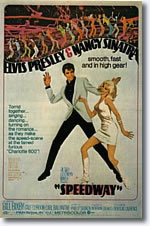
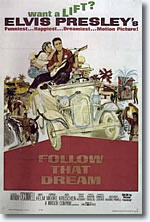
You always love your retarded children more than the others. Producers other than Hal Wallis discovered that you could make more money with a cheap Elvis movie than you could with an expensive Elvis movie. And this accounts for the bulk of the Elvis filmography, what I like to think of as the “real” Elvis movies. They have the texture of Formica, the depth of cellophane and the complexity of a gallon of buttermilk. They don’t feel like movies at all, they feel like episodic television. This week on Elvis, Elvis is caught behind the Iron Curtain and must match wits with batty spies in order to get to his big singing gig! They are uniformly genial, sporadically charming and cinematically dead on arrival.
In each one Elvis plays a singing racecar-driver/speedboat-driver/cliff-diver/helicopter-pilot/boxer/hillbilly who has to win the race or win the big fight or solve the mystery. In Tickle Me he has to hunt for buried treasure in an abandoned western town which may or may not be haunted. Four decades of Scooby-Doo adventures have robbed this movie of much of its surprise.
Novelty songs abound, and I pretty much adore every song from every one of these movies. Girl Happy has the best of them, a charming number called “Fort Lauderdale Chamber of Commerce.” (yes, you read that right.) Paradise Hawaiian Style features “A Dog’s Life,” which is sung to, who else, a helicopter full of dogs, and also “Queenie Wahini’s Papaya.” Fun in Aculpulco has “No Room to Rhumba in a Sportscar.” Tickle Me, the cheapest of the movies, actually benefits from not having any “new” songs for Elvis to sing. Instead, he gets to sing some actual blues numbers from his post-army years, and one is actually reminded for a moment that he is one of the most significant American talents of all time.
It Happened at the World’s Fair includes a cameo by the young Kurt Russell, who plays a snot-nosed brat who kicks Elvis in the shin. It also contains the only intentionally funny joke in the Elvis filmography: Elvis walks down a street by himself, flips through his “little black book,” looking up a girl who lives nearby. He finds her name and recites “Mary. Hmm. 36-24 — pause — Maple Street.” He then cocks his eyebrows and moves on.
Clambake holds a special place in my heart. It represents what may possibly be the nadir of Elvis’s personal life. He had put on thirty pounds or so, was taking spiritual advice from his barber, and had cracked his head open on a sink the night before shooting began during one of his adventures in pharmacology. As a result, his hair is combed into permanent, shellacked bangs and the belted leisure suits he wears make him look like Ubu Roi. It also features the worst song, bar none, of his career, a “High Hopes” knockoff called “Confidence,” which he sings to a playground full of kids. Now, keep in mind that, ten years earlier, Elvis Presley was enraging parents, scandalizing censors and making teenage girls go weak in the knees. Now he’s singing to children about building confidence. It’s an obscenity. I love it.
THE ALSO RANS
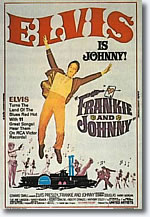

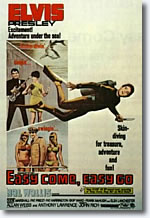
What does it say about a movie when it just isn’t quite as good as a low-budget Elvis movie? And yet, these movies, for whatever reason, don’t make the cut. Easy Come, Easy Go, in spite of being a Hal Wallis production, is a stupefying atrocity, where Elvis, no kidding, plays a singing scuba diver who must battle evil hippies in order to find sunken treasure. Live a Little, Love a Little is a Mad Ave comedy that co-stars Rudy Vallee and features a “psychedelic” number, “Edge of Reality,” where Elvis sings to a man in a Great Dane costume. Frankie and Johnny is a period piece which should, theoretically, give Elvis a chance to explore the roots of his music, but which does not.
MUST TO AVOID


Harum Scarum isn’t just a bad Elvis movie, it’s one of the worst movies ever made by anyone. Agonizingly boring, impossible to sit through, full of crappy songs, cheap sets, bored actors, nonexistent editing and uninspired writing and direction. Stay Away, Joe, in addition to having perhaps the worst title of any Elvis movie (they might as well have called it Stay Away, Audience), features Elvis, I could not invent this, singing a song to an impotent bull.
THE LATE EXPERIMENTS
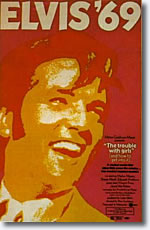

Late in his film career, Elvis abruptly stopped making “Elvis Movies” and returned to trying to make “real” movies. Charro! is a Clint Eastwood western without songs, The Trouble With Girls is a bizarre, unwieldly, Altmanesque portrait of life on the Chatauqua circuit circa 1929, and Change of Habit is an urban “problem drama” with Elvis starring as a ghetto doctor who falls in love with a nun. The nun (Mary Tyler Moore) must choose between Jesus and Elvis.
They all suck, although Change of Habit does hold the viewer in a certain stateof ghastly fascination.

This post is actually a bad song by Dolores Fuller
I have indeed always been entranced by Change Of Habit. It’s one of the few Elvis movies I watch every time it’s on. The climactic scene in which Mary Tyler Moore is torn between love of Christ and love of Elvis–and the smash-cutting back and forth between the King and the King of Kings–is just one of my very favorite moments in his film career. And all camp-appreciation aside, I do like Elvis’ work in Change Of Habit, I think precisely because a certain weariness comes through in his performance. It’s probably simple exhaustion, burnout from making rote cheapy movies, something, but for me it’s always translated into a bit more edge, a bit more depth than usual. I often wonder what his performance would have been like–and what it would’ve done for his career and his life–had he been able to do A Star Is Born with Streisand, as she supposedly intended. I’d like to think he would have really been great, that the material would have finally been the perfect fit he needed and never found in all those clambakes and car races.
It Happened At The World’s Fair is another favorite, but mostly because I used to live in Seattle, and at one time I did in fact recreate his dancing-singing musical number on the Flag Pavillion.
I don’t think that either of us is capable of summarizing the totality of Colonel Tom Parker’s evil. He sucked the life out of Presley like a big tick on a sick old dog. One could certainly make a case that Elvis’ film career–which I think showed some early promise–was the most effective portion of a monstrous machine designed to bludgeon and purée Presley to a neutered, culturally inoffensive and insignificant pulp. He was the most powerful symbol–for a time maybe even the most powerful force–of a breathtaking cultural revolution. The Army and the movies did their best to turn him into Frankie Avalon or Bobby Rydell, a faddish pretty-boy laughing stock. But his best work endures, and even the worst of his movies are hard to dislike. You’re right–they’re not movies the way Bonnie and Clyde is a movie. But they’re documents of their time and of their star, and I think they work because at their core they give us a chance to spend some time with someone we really, really like, someone we wish we knew, like a friend. Maybe that’s all that matters.
Besides, it could have been worse. At least he didn’t end up in The Fastest Guitar Alive. Poor Roy.
A postscript: I’ll spare you (too late?) but it’d be interesting to compare/contrast Elvis’ film career with that of Mr. Bowie, who shares his vocation and his birthday and has also done his share of questionable films (but has had a bit more critical success)…
Re: This post is actually a bad song by Dolores Fuller
1. Dolores Fuller, in addition to being an Ed Wood player, was the composer of five of my favorite Elvis soundtrack songs, including “Do the Clam” (strangely, not from Clambake but from Girl Happy) and the titular song from Spinout. Not to mention “Rock-a-Hula Baby,” which probably saw her into her old age, as it was the b-side of “Can’t Help Falling in Love.” She wrote ten altogether but the other ones are undistinguished.
2. From the beginning, David Bowie made sure to keep his rock-n-roll persona and his acting persona separate. That does not, necessarily, make him a better actor, but it’s comparatively rare that a movie utterly grinds to a halt because David Bowie walks onscreen. He never made a wisecrack and then went into a song about, say, painting a boat. He is, however, a unique presence and must be cast properly. He’s perfectly cast in The Man Who Fell to Earth and The Hunger and Labyrinth as eternal outsiders, and his appearance in The Last Temptation of Christ is notable for its restraint and gravitas. He’s unrecognizable in The Prestige, but again perfectly cast.
I could write a book (or a musical, which, actually, I did) about Col. Tom Parker and his effect on Elvis’s career. The most shameful thing about it all is that he never understood the artistic import of what he had — he treated Elvis’s career, from beginning to end, as though it was some kind of cheap fad that was going to dry up and blow away at any minute, so he’d better make as much money as he could on him as quickly as possible.
I once wrote an adaptation of Dr. Faustus where Faust asks Mephistopheles for 24 years of wealth and fame and Mephistopheles (played onstage by, who else, James Urbaniak) said “24? You aim high; 23 was good enough for Elvis.”
As I note above, the big-budget Elvis movies and the “real” Elvis movies don’t work for me — it’s the genial, goofy, low-budget crap that gets his essence across better. I’m totally serious when I say I love these movies — my pulse races when I see the title sequence of Speedway or Spinout and, believe it or not, I once pitched Clambake to a producer as a straightforward romantic comedy — I left out the title, Elvis and the speedboat subplot — and got the job.
Re: This post is actually a bad song by Dolores Fuller
It was “Have A Happy” from Change Of Habit I was thinking of, specifically, for some reason (that was her, wasn’t it?) “Spinout” is top notch.
Is it that Parker didn’t understand the artistic import, or is it that he didn’t care? From what I’ve read it’s as if he intentionally vetoed anything “artistic” because he felt it was risking the franchise. Something Mike Love emulated in dealing with Brian Wilson. It certainly seemed that to Parker, Elvis was just a trained monkey to be worked to death. I don’t know whether to credit Elvis’s unfathomable loyalty to the man as a testament to his character, or chalk it up to Stockholm Syndrome.
The “unique casting” that Bowie’s presence requires, that’s often what I feel was missing from Elvis’s career. Maybe I’m wrong, maybe he would have overpowered anything and everything by virtue of his electric presence and his standing as the most popular figure of his time (and he could certainly never disappear completely into any role), but I always felt like there was a good actor there if only there had been a role that had fit him — that somehow reflected the reality of his life the way A Hard Day’s Night was a funhouse-mirror reflection of the Beatles’ lives. Something that gave him a chance to express what he had lived through, the unique point-of-view that can only come from being in his literally awesome and unspeakably hellish position. Sinatra’s film work sometimes touched on that. That’s why I always wonder about the Star Is Born thing. The potential was there. I bow to your far superior knowledge of all things Elvis, but I really do like his dramatic work and there are moments, flashes of real emotion and real connection there for me.
I agree with you about the lower-budget Elvis movies. I grew up watching them virtually every weekend on TV, and I have a real affection for them–the songs, the cheap bluescreen action scenes, Elvis’s good-natured presence. But I don’t mind the other ones, really. My expectations for Elvis movies, as you’ve said, tend to be carefully managed.
Supposedly, Dolores Fuller is still alive, so one hopes the “Rock-A-Hula-Baby” royalties are keeping her comfortable.
Re: This post is actually a bad song by Dolores Fuller
I don’t think Col. Tom understood the words “artistic import.” He made deals to make himself rich, plain and simple. He didn’t care about music, art or Elvis’s health and well-being.
One example of a classic Col. Tom negotiation was his deal with the International in Vegas. He signed Elvis on for five years at a million dollars a year. That was the biggest contract anyone had ever signed in Vegas, but still makes no sense at all. The smart manager would have signed his client for one year at one million dollars, and then when Elvis had a year of smash business make the second year for two million dollars. Even in 1969, Col. Tom was acting like his client actually had no appeal at all, like he had to stick the hotel for as much money as he could get up front because Elvis, in his estimation, could never possibly be worth that kind of money. Col. Tom wasn’t a manager, he was a con man, and proud of it. He didn’t like to make deals, he liked to con people. He called himself the “king of the snowmen.” Elvis’s movie deals were structured in such a way as to make Col. Tom substantially more money than Elvis was getting. The reasons the songs in the movie are so bad is because Col. Tom would only allow Elvis to sing songs written by composers who worked for Col. Tom’s publishing company, and forbade Elvis to sing songs that he couldn’t collect publishing royalties on. The list goes on and on. Why didn’t Elvis ever play outside the USA? Because Col. Tom didn’t have a passport. Why didn’t he have a passport? Because he was an illegal immigrant, who, rumor has it, fled Denmark on suspicion of murder. Why were Elvis’s album covers so butt-ugly? Because Col. Tom wouldn’t even spend the money to hire a real designer. Just slap some picture of Elvis on there, didn’t matter if it was new, old, unrelated to the project or hideous, put Elvis on it and his audience of hicks and teenage girls will buy it, is how he felt. He not only hated his client, he hated his client’s audience, thought they were just a bunch of rubes, marks to be taken in a con game. An incredible story.
Why did Elvis put up with it? Who knows. Some say that Col. Tom was some kind of hypnotist, but I think it’s more that Col. Tom probably reminded Elvis every day that Elvis was nothing more than a good-looking truck-driver who got lucky and would be nothing without Col. Tom, and Elvis probably believed him. It probably didn’t hurt that Col. Tom’s contracts, combined with Elvis’s spending habits, would have made it impossible for Elvis to ever buy Col. Tom out.
Of the Elvis movies, Loving You and Jailhouse Rock come closest to being his Hard Day’s Night. What Elvis seems to have lacked, cinematically, was the Beatles sense of irony. Elvis had irony to spare but was too earnest in his “serious acting” roles. I too wish he had done the Star is Born movie, it could have even saved his life. Ah well.
Re: This post is actually a bad song by Dolores Fuller
But, you know, you bring up a good point. Why did Elvis even have to play something other than “a famous rock-n-roll singer?” The Beatles didn’t have to pretend to be racecar drivers or hillbillies in their movies, they were The Beatles, World-Famous Rock Band. There’s no reason Elvis, in, say, Clambake, couldn’t simply play Elvis Presley, a Famous Rock-n-Roll Singer who decides to disguise himself in Miami as a lowly waterskiing instructor in order to see if women will love him for who he is. The movie, all these movies, would have a lot more energy and oomph to them that way. He could have been Elvis Presley, who has to win the race or dive off the cliff or tangle with spies.
One of the worst insults occurs in Roustabout, where Elvis plays another down-on-his-luck hillbilly who quits his gig singing for frat boys and takes off cross-country on his motorcycle. Trouble is, the motorcycle he takes off on is a tiny, polite Yamaha street bike, a bike no self-respecting motorcycle enthusiast would be caught dead riding cross-country.
Re: This post is actually a bad song by Dolores Fuller
Not to belabor the point, but that’s exactly what I think deadens so many of Elvis’s performances, so many of his movies. Most actors, even big Hollywood movie stars, are relatively ordinary human beings portraying extraordinary characters. Even when Julia Roberts plays Erin Brockovich, she’s playing someone who did extraordinary things in mundane trappings. These are actors being asked to do something beyond themselves. Time and again in his movies, Elvis was this extraordinary character being asked to be mundane, to please do nothing, please be nothing. It’s insane on its face, to have this charisma and magnetism and be asked to squelch it. The last thing he could possibly have related to, even if he had the sense to long for it, was to be an anonymous, average Joe doing these things, struggling to get the girl. You’re absolutely right that there’s no reason he couldn’t have played “Elvis Presley” as a character and kept some connection to his core self. Then again Peter Tork played a character called “Peter Tork” on The Monkees with disastrous results for his psyche, so maybe I’m full of it again. Perhaps fate is what it is.
Still, Presley playing a genuine national sensation and struggling with it, for good or for ill, might have been amazing. Imagine Presley in something like A Face In The Crowd (or something similar but less malevolent). But ah well. I suppose that if one doesn’t believe in evil (and I share that), and if the hereafter absolves everyone, it must somehow absolve Colonel Tom Parker (or whatever his insane sociopathic fugitive Dutch murderer name was…it’s like a Hitchcock picture, sometimes…)
Also, I think the upcoming Easy Come, Easy Go-inspired episode of Venture Bros, in which Brock is a Zep-singing ex-Navy Seal who must battle evil hippies and seasick pirates and have sex with a murderous Guild operative from the Munsters in order to find Jonas Venture Sr’s sunken X-3 nuclear submarine and the preserved remains of Rusty’s vestigial third nipple, is my favorite episode of the new season.
Re: This post is actually a bad song by Dolores Fuller
All due respect to Peter Tork, but Elvis Presley was already quite well-established as “Elvis Presley” before he ever had to play Elvis Presley in a movie (although one could say that he played “Elvis Presley” throughout his life). Peter Tork wasn’t anybody at all before he was asked to play “Peter Tork” on The Monkees.
I hope you’re kidding about the Venture Bros. episode.
Re: This post is actually a bad song by Dolores Fuller
I was indeed kidding about the VB episode. That is actually a skit from the forthcoming spinoff series, The Intangible Fancy And Friends Good-Time Variety Hour. I’m desperately trying to get on staff…
I take offense, sir! The sheer volume of film production out of Mumbai makes the average quality of Hindi films lower than Hollywood, but saying that they “cannot be enjoyed if compared to other movies” is prejudiced.
The Academy, for example, disagrees with you, nominating “Lagaan” for Best Foreign Film in 2002.
If you want some suggestions, just ask – I’d be more than happy to oblige.
Is Lagaan a musical?
By “other movies” I guess I mean “Hollywood movies.” And all I mean is it’s wrong to judge crap from Mumbai against crap from Hollywood; they play by completely different rules.
Yes, Lagaan was a musical. The music was composed and arranged by AR Rahman. I recommend you rent it, ASAP. It’s a political/sports movie. Bollywood finds a way to connect unlikely themes…
And I will accept your explanation, but I must say, crap is crap whereever it comes from; it’s the *good* films from both Mumbai and Hollywood that differ from each other – and, really, all that’s cultural- can we not judge its cinematography, its direction on the same wave-length?
Of course it’s all cultural. And you can’t place The Godfather next to, say, Drunken Master II and say they are equally good — they are both masterpieces, but are completely different entities, made for different audiences with vastly different aesthetic goals.
I’ll also go as far as to say, sight unseen, that any given five minutes of Lagaan are more cinematically accomplished than the totality of Elvis Presley’s film career. Although I might not say that about the ’68 Comeback Special.
OK, I see what you mean now.
Poor, poor Elvis… Harem Scarem is great. 🙂
See, that’s how bad Harum Scarum is — they went ahead with the title with its stupid pun, even though it meant misspelling “harem.”
In the UK, where civilization still reigns, the film was titled Harem Holiday. However, Spinout was California Holiday, which is a terrible title.
I think you mean “where civilisation still reigns”.
What confuses me about the misspelling in that title is that “Scarem” makes at least as much sense as “Scarum”. Except that “harum-scarum” is a phrase that predates the movies by a couple of centuries.
I appreciate the colour of your humour.
I assumed at first that Harum-Scarum was changed to Harem Holiday in the UK because “harum-scarum” was considered an American idiomatic word. But the OED puts “harum-scarum” at 1674, and acknowledges a number of different spellings, all of which are centuries out of use.
The word means “recklessly, heedlessly, wildly” which, in addition to itself being a better title than Harum Scarum is a good indication of Elvis’s behavior in the 1960s.
The OED seems to think that the word is a rhyming combination referring to how a hare runs when it is frightened. Therefore, “harem-scarem” would actually be the “proper” spelling, if Harum Scarum had been made in 1784, which would be a feat in and of itself.
[He’s not believable as a cowhand, a half-breed or a down-on-his-luck kid. First, he’s not a very talented actor, second, he throws off charisma like a 1,000,000-watt lightbulb, blasting character, plot and every other actor offscreen (or into irrelevance). So you’ll have a couple of actors sitting around talking, pretending they’re in a “real movie,” and then ELVIS PRESLEY walks in and any sense of watching a “real movie” goes right out the window.]/end quote.
So true! It’s like typecasting to the nth degree. There’s *no way* you see him as anyone but Elvis. I love Elvis movies, but they *do* suck. As a matter of fact I could always imagine MST3000 doing an Elvis movie; (hey look! it’s Elvis!) but alas, it never happened.
Shame.
Viva las Vegas
I agree with so much of your incredible analysis, but I won’t give up on “Viva las Vegas”, in the same way I like to discover a young Don Rickles doing bits in “Beach Blanket Bingo” movies (a close cousin of some of the Elvis genre). It just all belongs to screen-memories that can not be rationalized any longer!
But to take the devil’s advocate role here, assume Elvis wasn’t simply a rube, and the deal with the devil had some time to play out anyway (you note he managed still to sing the blues to some affect) he must have managed something that was to some degree ‘correct’ in all those films – at least for him – so what would that have been?
He was a star, cinema didnt help him. He was incredibly comfortable on the concert stage, so it wasn’t some Sgt. Pepper / Pet Sounds desire for the big-S Studio. He wasn’t solely manufactured like the Monkees, he had no issues of persona/character-development a la Bowie, Elvis was who he was, not so much Iggy, more like Popeye really.
If he had lived in a different decade, lets say he started in the 80s, he would have been perfect in some Scorcese films.
But seeing him in the time period he did exist within, I always got the feeling there was something sinister and significant in what was being left untapped within the potential of Elvis, festering trapped between all the transitions, the 50s, 60s, 70s, and then suddenly expressed in the most inane places (Elvis went to talk to Nixon for Gods sake) He was just… wrong almost all the time, except on stage where he was so clearly comfortable with himself. And that somehow made him adorable for a public I guess. The occasional gem (Comeback special) was produced to remind us of that potential, all in black leather even…
FW
Viva las Vegas
Re: Viva las Vegas
There is nothing to give up on. As I say, it’s the best of the bunch and stands as a good “gateway drug” to the Elvis Movie genre.
Elvis wanted to make “real” movies, and said so many times. He wanted to work with the best and the brightest. Thing is, Col. Tom wouldn’t allow him to do that. The best and the brightest might want their name on the marquee or, worse, a share of the profits, and that is something Col. Tom could not allow. Elvis, in his mind, owed nothing to anyone and was the sole purpose for the whole enterprise to stand — why make a “real movie” if you could make a great deal more money (more than Elvis, in fact) on Elvis Movies?
The real pity is that Elvis not only wanted to make “real movies,” but he wanted to record “real music” at the same time. He kept trying to record actual songs to keep his serious artistic pursuits alive, but those recordings kept getting shuttled to the crappy soundtrack albums, which had to be released three times a year. For instance, his astounding recording of Bob Dylan’s “Tommorow is a Long Time” is dumped at the end of side 2 of the Spinout album, after a half-hour of moronic novelty songs about racing cars and chasing women.
Three albums a year! A pace Elvis kept up, incredibly, until his death. Think of that. That alone would be the artistic death of any artist today. Imagine if Bruce Springsteen, Bob Dylan, REM, the Rolling Stones were contractually bound to deliver three albums of new material every year.
It was not until Ernst Jorgensen took charge of Elvis’s catalog in the 1990s that the magnitude of his artistic accomplishment began to come into focus.
Re: Viva las Vegas
Elvis’s visit with Nixon is one of the most bizarre and improbable events in his life. Fact is, he disappeared from Graceland one day, unable to cope with one thing or another, got on a commercial jet, high as a kite and carrying a gun, and flew to Washington on a whim. He “showed up” at the White House, again, carrying a gun, and was promptly let in to the Oval Office, where he presented Nixon with the gun as a gift and, still reeling from drugs, asked what he could do to help stop the spread of illegal narcotics in America. Nixon obliged by making him an honorary FBI agent. In my Elvis musical, Elvis also takes the opportunity to suggest that Nixon record his private conversations and bomb Cambodia.
First of all, just curious: In your musical, where does the music come from? Actual Elvis material? Is your Elvis played straight, or is it more in the Elvis-imitator mold?
Secondly: As a final thought on Elvis as screen-figure: Elvis was a product of the 50s, and seemed never really to manage (or had the right manager) to comprehend the potential new openings within the world of pop-media culture around him. Although the figure for one of Warhol’s most iconic silkcreens (Double-Elvis for example) he was surely not the one able or willing to comprehend the new pop culture Warhol reflected.
But a decade after Elvis emerged, what a difference in music-media packaging: The Beatles (for whom Elvis was still a figure of importance) arrival onto the American music scene, drew alongside a whole packaging industry, such that there was hardly a year gone by before they were literally neutered TV-cartoons for the kids existing alongside the albums, which came out rather fast as well back then. In their movies it was Richard Lester’s pop-culture antics that framed “the boys”. For the beatles, it was their albums and not cinema which brought them a kind of open, adult freedom – Sgt.Pepper took the cartoon and returned it with a vengence.
Elvis never had the duality of the pop-culture cartoon figure with his music figure, in that way he was always in a strange “boy-adult” transition which as I mentioned in the previous post, is sort of dark in all it seems to reflect of potential. Sinatra, as comparison to a 40s figure, was adult, and also able to behave as an adult, the person, in terms of cinema, or dealing with things like microphone technique, composition, etc.. (Although, ironically, the big crisis was when his voice changed…hm.)
Elvis’s inability to settle into one or the other made him, I guess, more of an “adult-threat”. So his way out of the crappy cinema package was to utilize cinema as it followed him in documentaries, around certain phases of concert life. The concert-documentary form suited his own nature, ambivalent as it was. There I think he was aware, and utilizing cinema in the best way he could, because of course he was an actor on stage but it was his character. And he was showing an awareness of the cameras on him, the stage, and again, has no problem with the private, backstage and the onstage mixing in. Just watching him develop for example, the whole Vegas act, and the film made that whole issue of his incredible scene-presence by its only iconic line – made precisely by his absence – “Elvis has left the building”. So I think he did use the situation of cinema to capture the convergence of his persona, character, publics and music on the one stage where he could control, and that is where he was really doing his idea of cinema and acting, despite any of his protestations to wish to be a “real” actor.
FW
My musical, King Lucky, was a fictionalized account of an Elvis-like person who just happened to live the same life as Elvis Presley. The songs were hilarious, affectionate parodies of Elvis songs written by Chuck Montgomery (yet another Hal Hartley regular in my acquaintance) who also played the lead.
(The show actually had its roots in a sketch I’d seen Chuck perform years earlier, where he played Elvis Presley on the set of a movie called Clam Happy. The title song, performed in the sketch, had this bridge:
C’mon, little bivalve
I wanna pry open your shell
There’s steam comin’ out of my valve
I’m gonna dig myself a little wishing well
For our musical, I would tell Chuck that I needed a song like “I Believe” or “Lover Doll” or “Do the Clam” (mostly the songs were parodies of movie songs) and a perfect, affectionate, spot-on parody would come spilling out. It was great fun to spend a year our lives thinking about Elvis Presley.
I think you’re right that the Beatles rode the irony wave of mass promotion better than Elvis, but I don’t think that Elvis was unaware of the tension between his actual self and the persona his merchandise was selling. Popular culture may not have reached the level it did ten years later, but Elvis (or, really, Col. Tom) was certainly aware that Elvis could be more than just a singer selling records. There were mountains of crap sold with Elvis’s name on it. Although it’s true there was no cheap cartoon starring a neutered Elvis, I think his movies starring the actual Elvis served the same purpose — getting Elvis out in front of an audience without actually putting him on tour. The Beatles didn’t like selling themselves as “cheeky lads” any more than Elvis liked selling himself as a family-friendly goofball. Elvis just took a much longer time getting out from under his cinematic burden (he essentially made 20 Help!s before they stopped becoming profitable).
Elvis’s acquiescence to the market’s wishes had a lot to do with his desire to be seen as “professional.” Ironically, when he finally brought in a “real” director to direct his TV special, not some hack who would do what Col. Tom told him to, the artistic result was stunning and finally showed the world what a cinematic Elvis could be.
“Bubba Ho-Tep” was actually pretty good, although I suppose it doesn’t technically count as an Elvis movie. It is amusing to imagine how Elvis would have played “himself” if he had still been alive.
That little estimate of inept genres….
left out the films of Godzilla and his ilk.
I’m so relieved that Harum Scarum was on your “must to avoid” list.
I was worried that you were going to say that I missed something when I tried (I really, really tried) to watch it, years ago… I had to leave the room at the 45 minute mark.
I made it (pretty easily) through Clam Bake, and you’re right, there’s a huge difference. For what it’s worth.
Clambake is to Harum Scarum as The Winter’s Tale is to Henry VIII.
Pawns
Green Lantern is the Pawn because it’s a job. You taught me that.
M.E.
4chan is everything that’s wrong with the Internet. There is no reason for a well-adjusted person ever to go there.
SomethingAwful produces some funny stuff though, even if their peculiar little internet subculture can be baffling and sometimes downright stupid.
Basically, SA is a site that starts with the premise “the internet is a horrible place full of stupid things” and amuses itself by making fun of everything. This ends up including a lot of self-mockery — There’s a whole subforum on SA devoted to making fun of people who post stupid things on the other subforums. It’s a strange place.
(Actually, I think 4chan originally started a spin-off of the people who were too annoying/random/perverted/ADD for SomethingAwful’s anime subforum. Which, really, tells you all you need to know.)
I THINK ALOT OF “ELVIS MOVIES” ARE SOME WHAT GOOD SOME CAN BE BAD BUT THEY ARE GOOD WE LUV YOU ELVIS!!!!!!!!!!!!!!!!!!1